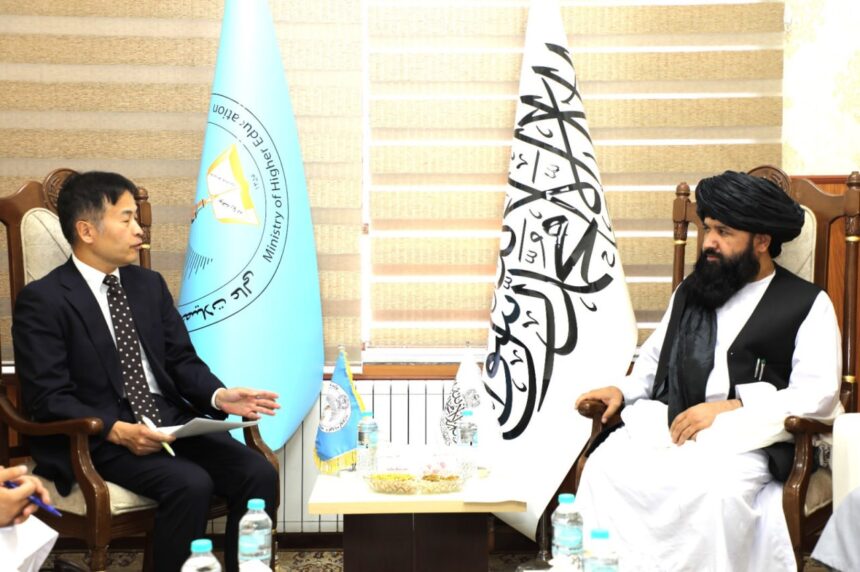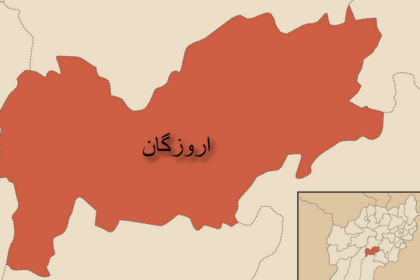RASC News Agency: In a display of the Taliban’s growing defiance against international norms and human rights, Mawlawi Nada Mohammad Nadim, the acting Minister of Higher Education and one of the regime’s most hardline ideologues, declared that the enforcement of “Islamic Sharia” remains the group’s top priority not the education of Afghanistani girls. His statement came during a formal meeting in Kabul with Takayoshi Kuramaya, the Japanese ambassador to Afghanistan, where Nadim reaffirmed the regime’s unwavering commitment to its gender-apartheid policies. According to a statement released by the Taliban-controlled Ministry of Higher Education, Nadim accused the international community of hypocrisy, alleging that global powers “chant slogans of support for Afghanistan” while simultaneously threatening Taliban leaders with prosecution. This defensive rhetoric reflects a regime increasingly isolated and under pressure, especially as international legal institutions begin to take serious steps toward accountability.
The meeting comes at a time when the Taliban face mounting global condemnation for their systematic erasure of women and girls from public life most notably, through their sweeping ban on female education. Despite sustained pressure from Western governments, the United Nations, and Islamic scholars across the Muslim world, the Taliban leadership continues to resist reopening schools and universities to female students, insisting that education must conform strictly to their interpretation of Sharia law. Mawlawi Nadim has emerged as one of the most controversial figures in the Taliban hierarchy. A staunch opponent of women’s rights and modern education, he has been a vocal architect of the regime’s draconian policies against academic freedom. Since assuming office, Nadim has overseen the ideological cleansing of the higher education sector: female students have been banned, university curricula purged of secular content, and faculty members suspected of liberal or Western sympathies removed en masse.
Before his appointment as education minister, Nadim served in key Taliban roles, including head of intelligence in Kabul and governor of Nangarhar province positions marked by repression, puritanical enforcement, and resistance to modern governance. His rapid ascent within the Taliban ranks is emblematic of the regime’s broader shift toward hardline clerical rule and its deep hostility toward education as a tool for social empowerment. Yet what makes Nadim’s position all the more egregious is the regime’s hypocrisy. Independent reports have revealed that while Taliban leaders publicly deny education to millions of girls across Afghanistan, many of their own daughters are quietly studying at universities in Pakistan and Gulf countries. Nadim himself is alleged to have facilitated overseas education for his relatives, even as he spearheaded the closure of classrooms for other Afghanistani girls.
This flagrant double standard illustrates the deeply discriminatory and self-serving nature of Taliban governance a regime that exploits religion to entrench authoritarian control while reserving privilege and opportunity for its inner circle. Nadim’s remarks also follow a major legal development on the international stage. Just last week, the International Criminal Court issued arrest warrants for Taliban supreme leader Hibatullah Akhundzada and Chief Justice Abdul Hakim Haqqani on charges of crimes against humanity and gender-based persecution. Haqqani, another staunch advocate of extremist doctrine, has publicly stated that the return of Taliban rule removes any “excuse” for delaying the full imposition of their version of Islamic law.
These developments reinforce growing consensus among international legal and human rights experts that the Taliban’s actions amount not just to social injustice but to systematic, state-sponsored gender persecution arguably one of the most severe cases of gender apartheid in the 21st century. Despite their public claims of moral legitimacy, the Taliban’s actions betray a deliberate and calculated effort to extinguish half the population’s access to education, mobility, and dignity. Under Mawlawi Nadim’s stewardship, Afghanistan’s higher education system is not merely being restructured it is being dismantled and ideologically weaponized to erase intellectual pluralism and institutionalize gender-based discrimination.
Far from upholding Islamic values, the Taliban’s educational policies reflect a cynical manipulation of religion to suppress dissent and entrench patriarchal dominance. For millions of Afghanistani girls who once dreamed of becoming doctors, engineers, or teachers, the classroom has now become a forbidden space a symbol of both their exclusion and the regime’s fear of an educated society. Nada Mohammad Nadim is not merely an education minister; he is the embodiment of the Taliban’s war on knowledge, equality, and progress. His legacy, and that of the regime he serves, will be remembered not for building a nation but for extinguishing its future.
As international outrage grows, the question becomes more urgent: how long will the world continue to tolerate a regime that criminalizes female ambition, exploits religion to enforce tyranny, and denies its people the basic right to learn?






